By: Stephen Dalina
On November 6th, 2019, football fans celebrated the 150th anniversary of the first college football game, which was played by Rutgers and Princeton University. It was University Archivist Erika Gorder’s and my pleasure to assemble an exhibit celebrating not just college football, but also the game’s evolution alongside the growth of Rutgers University.
For myself, this exhibit was match made in heaven! My father is a longtime Rutgers employee, so going to Rutgers football games and other athletic events filled my childhood. I attended St. Joseph’s High School (Metuchen) and had the privilege to play varsity football with a plethora of talented young men, a handful of whom went on to play for the Scarlet Knights. I had the opportunity to pursue my love of history at Rutgers, obtaining my bachelors’ degree in 2018. I had the unique viewpoint of being a Rutgers football superfan while having a background in historical research. The stars were aligned.
The exhibit captures the spirit of event, the essence of the birth of a national pastime, and the meaning of college football in relation to Rutgers’ prestigious legacy. To encompass a 150 years of history, the archives were thoroughly investigated for any items that interconnected with history of Rutgers with its football program.
The 1st collegiate football game was played differently than how we witness the pastime of football today. Rutgers’ squad of 27 players – only 25 took the field at a time – defeated Princeton 6-4 in the first intercollegiate football game, more like soccer than the modern sport. The game was played on the property that the College Avenue Gym parking lot now inhabits. Princeton won a second match that year, allowing both schools to claim the sport’s first national championship. A third match between the two New Jersey rivals was canceled, because professors said studies were disrupted by the uproar.
Rutgers’s George Dixon and Stephen Gano are accredited for the game’s first score. William J. Leggett, ’72, elected by his teammates as captain of the 1869 Rutgers team. Leggett and his counterpart from Princeton, William S. Gummere ’70, met prior to the starting time of the game to discuss and agree upon the rules of the game. Both men went on to distinguished careers, Leggett as a Reformed clergyman, and Gummere as Chief Justice of the Supreme Court of New Jersey.
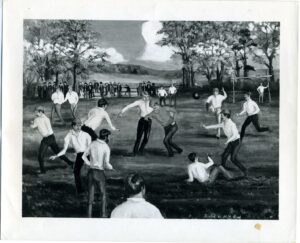
Boyd’s depiction, as well as other depictions, of the game were done several years after it had taken place. Therefore, these depictions are not 100% accurate to how the game was played. The only first person account we have of the game comes from a copy of the Targum, currently on display at University Special Collections and University Archives in Alexander Library.
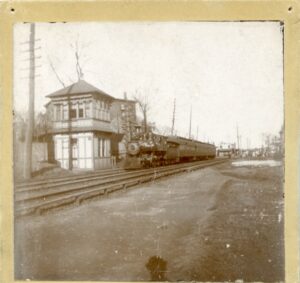
Princeton players took a train to play against Rutgers in New Brunswick. These tracks are now inhabited by NJ Transit.
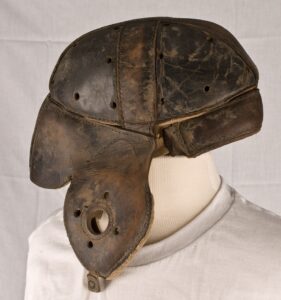
This helmet is typical of ones players wore in the 1920s. The exhibit features a whole uniform from a 1920s lineman.
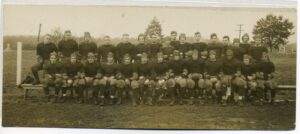
The 1918 team coached by George Stanford featured Paul Robeson, Rutgers’ first All-American. Robeson would go on to be known as a true Renaissance man, renowned as a musician, actor, and political activist. He was forced to sit out one game due to a request from the University of Washington and Lee due to their apprehensiveness to play against an African American player. That was the only game Rutgers lost that season.
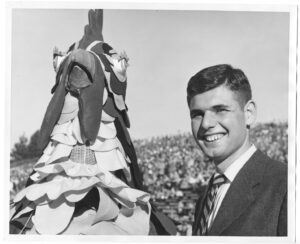
Rutgers’ fullback Steve Simms officially says goodbye to the Chanticleer as the mascot of Rutgers during a ceremony to mark the end of his reign. The Scarlet Knight then took over as the mascot we now know and love.
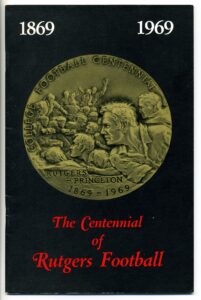
Publication sold at Rutgers Vs Princeton Game to celebrate the 100th Anniversary of College Football.
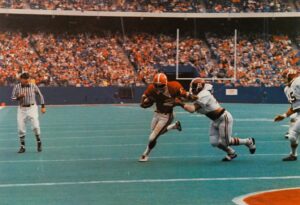
Photograph of Rutgers playing University of Alabama, which Alabama won 28-25. Of the game, Alabama coach Bear Bryant gave the famous quote, “We won, but we didn’t beat them.”
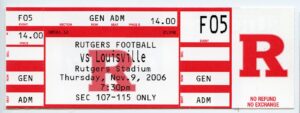
Ticket from Rutgers Football’s greatest victory under Greg Schiano’s tenure. The 15th ranked Scarlet Knights upset the 3rd Ranked Louisville Cardinals.
The project was a collaborative undertaking. Memorabilia displayed in the exhibit was provided by collection here at the University Archives and Special Collections along with some items from Steve Green, and Stephen M. Dalina (My Father).
I was a freshman at Rutgers College in 1969, an exciting time. To put things in perspective, in the Fall of 1969 we celebrated the 100th anniversary of college football with Rutgers beating Princeton and in the Spring of 1970, protests over the Vietnam War resulted in the closure of most universities in the country, including Rutgers.
Ken Kryvoruka
Rutgers College 1973